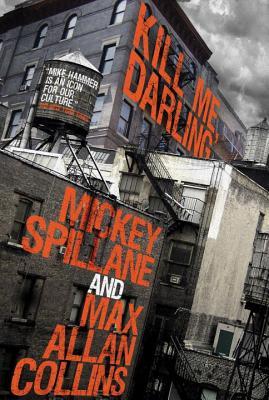 I've had a bout of flu and apologize for the tardiness of these last previews. On Friday, we'll show you covers of interesting-looking books and that will conclude our look at upcoming books for spring.
I've had a bout of flu and apologize for the tardiness of these last previews. On Friday, we'll show you covers of interesting-looking books and that will conclude our look at upcoming books for spring. By 1980, Mickey Spillane had written seven of the top 15 all-time best-selling fiction titles in the United States. Spillane introduced his tough-guy New York City detective Mike Hammer in 1947's I, the Jury, with a case involving the murder of Hammer's Marine buddy Jack. Hammer vows to Jack's corpse, "I'm going to get the louse that killed you. He won't sit in the [electric] chair. He won't hang. He will die exactly as you died, with a .45 slug in the gut, just a little below the belly button." After a steamy and sadistic investigation, boy, does Hammer deliver on that pledge.
By 1980, Mickey Spillane had written seven of the top 15 all-time best-selling fiction titles in the United States. Spillane introduced his tough-guy New York City detective Mike Hammer in 1947's I, the Jury, with a case involving the murder of Hammer's Marine buddy Jack. Hammer vows to Jack's corpse, "I'm going to get the louse that killed you. He won't sit in the [electric] chair. He won't hang. He will die exactly as you died, with a .45 slug in the gut, just a little below the belly button." After a steamy and sadistic investigation, boy, does Hammer deliver on that pledge.The last of Spillane's 13 books was published in 1996, when the author was near 80 and the popularity of his fast-paced, sex- and violence-filled series had waned. Black Alley finds Hammer awakening from a coma. All he really wants to do is avenge the death of an old army pal and marry his girl Friday with the "million-dollar legs," Velda Sterling. But he discovers he's mixed up in a search for billions in missing mob money. After Spillane's death, writer Max Allan Collins is continuing the series. He challenges Hammer with a kidnapping case involving a priceless archaeological find and Islamic terrorists and Israeli extremists in The Goliath Bone. Six books later, it's the mid-1950s in Collins's Kill Me, Darling (Titan, March 24). Velda has abandoned Hammer with a one-word note. Hammer responds with a four-month bender. His best friend, NYPD captain Pat Chambers, tells him Velda has been seen running around Miami on the arm of a notorious gangster. Of course, Hammer pulls himself together and hits the road for Florida to rescue his girl. I'm excited about this book because early reviewers say it's superb. It's based on an early unfinished Spillane manuscript and reportedly you can't tell where Spillane's writing ends and where Collins's begins. Publishers Weekly reports, "He even matches Spillane's colorful turns of phrase (e.g., 'My bullet shattered his smile on its way through him and out of the back of his head.')." This looks like a sure bet for Mike Hammer fans.
 This year is the 50th anniversary of the Selma to Montgomery marches for civil rights. It's a great time to begin Greg Iles's trilogy, starting with the Steel Dagger-nominated Natchez Burning (Morrow/HarperCollins, 2014). Dr. Tom Cage, beloved father of Penn Cage, the former Natchez, Mississippi prosecutor and current mayor, has been charged with the murder of Viola Turner. Turner was a terminally ill black woman who worked as Tom's nurse in the 1960s. At her death, she was under Tom's care. Tom refuses to defend himself against these charges and Penn's investigation goes back to the Civil Rights era in Natchez to discover why. It's an ambitious and moving thriller involving complex characters during a time of social upheaval.
This year is the 50th anniversary of the Selma to Montgomery marches for civil rights. It's a great time to begin Greg Iles's trilogy, starting with the Steel Dagger-nominated Natchez Burning (Morrow/HarperCollins, 2014). Dr. Tom Cage, beloved father of Penn Cage, the former Natchez, Mississippi prosecutor and current mayor, has been charged with the murder of Viola Turner. Turner was a terminally ill black woman who worked as Tom's nurse in the 1960s. At her death, she was under Tom's care. Tom refuses to defend himself against these charges and Penn's investigation goes back to the Civil Rights era in Natchez to discover why. It's an ambitious and moving thriller involving complex characters during a time of social upheaval.The trilogy's second installment, to be published by Morrow on April 21, is another 800 pager. The Bone Tree takes up where Natchez Burning ends. Iles delves into the 1960s history of his hometown of Natchez, linking real and imagined local and world events to his Cage family saga. The first two books have received excellent Goodreads reviews. The final one, Unwritten Laws, is due next spring.
 Paul Beatty's The Sellout (Farrar, Straus & Giroux, March 3) takes another look at race relations in the United States. It's not a white man's investigation into how past wrongs haunt the present but a satirical look at "post-racial" America with a black narrator from southern California whose last name is Me. We meet Me as he sits in front of the Supreme Court, openly smoking a doobie. He is there because actions he has taken to put his hometown of Dickens, California on the map have violated the 13th and 14th Amendments and the case has gone all the way to the country's highest court.
Paul Beatty's The Sellout (Farrar, Straus & Giroux, March 3) takes another look at race relations in the United States. It's not a white man's investigation into how past wrongs haunt the present but a satirical look at "post-racial" America with a black narrator from southern California whose last name is Me. We meet Me as he sits in front of the Supreme Court, openly smoking a doobie. He is there because actions he has taken to put his hometown of Dickens, California on the map have violated the 13th and 14th Amendments and the case has gone all the way to the country's highest court.After Me's father, a psychologist, was murdered by the police, embarrassed people refuse to admit the town exists and it is literally taken off the map. Me and the town's best-known citizen, former Little Rascals star Hominy Jenkins, begin a campaign to make the town incapable of being ignored. Farm land is turned over to marijuana. Me enslaves Jenkins (at Jenkins' request). Dickens adopts "the Lost City of White Male Privilege" as a sister town and re-segregates its local schools so only minority students can attend.
That's the plot, but as the Boston Globe puts it, it's only "gloriously skeletal, sometimes misplaced and forgotten, and often there so that Beatty (and his narrator) have an excuse to riff on the things that matter most to them: race, politics, music, television, Los Angeles." The buzz about this novel, Beatty's fourth, calls it a comic masterpiece.
 The moon explodes to begin a book Kirkus Reviews calls "[w]ise, witty, utterly well-crafted science
fiction," Neal Stephenson's Seveneves (William Morrow, May 19). Nobody knows what caused the moon to self-destruct so Dubois Jerome
Xavier Harris, Ph.D. springs into action. "Doob" (I hope his mom calls him "Doobie") and his fellow scientists figure the debris will eventually form rings around Earth like Saturn's but "hard rain" will in the meantime destroy the planet's living creatures. The International Space Station can house some Earthlings but obviously there isn't room for many. At the book's halfway point, it's 5,000 years later. Then, Stephenson takes us into deep space with seven human races, descended from the seven fertile women who survived the end of life on Earth.
The moon explodes to begin a book Kirkus Reviews calls "[w]ise, witty, utterly well-crafted science
fiction," Neal Stephenson's Seveneves (William Morrow, May 19). Nobody knows what caused the moon to self-destruct so Dubois Jerome
Xavier Harris, Ph.D. springs into action. "Doob" (I hope his mom calls him "Doobie") and his fellow scientists figure the debris will eventually form rings around Earth like Saturn's but "hard rain" will in the meantime destroy the planet's living creatures. The International Space Station can house some Earthlings but obviously there isn't room for many. At the book's halfway point, it's 5,000 years later. Then, Stephenson takes us into deep space with seven human races, descended from the seven fertile women who survived the end of life on Earth.Neal Stephenson blends history of science, sociology, math, cryptography, and technology into twisting and turning, dark-humored post-cyberpunk fiction. His books feature large casts of characters and elaborate multiple plot lines. If writers Tom Robbins, Philip K. Dick and William Gibson merged, Stephenson might be the result. Some of his best-known novels include Reamde (see here), Cryptonomicon, Snow Crash and the multi-volume Baroque Cycle (see here). It's a body of thought-provoking books and I strongly recommend reading them.
 I'm neither Roman Catholic nor a biblical scholar so I'm not the person to analyze religious-based criticism of Ian Caldwell's The Fifth Gospel (Simon & Schuster, March 3). I'm a fan of suspense and looking forward to reading the book that follows The Rule of Four by Caldwell and Dustin Thomason. That 2004 book centers around a long-lost diary that may be the key to a Renaissance text called
the Hypnerotomachia Poliphili. Its discovery poses danger to two Princeton friends, Tom Sullivan and Paul Harris. It reads as a hybrid of Dan Brown's The Da Vinci Code and Umberto Eco's The Name of the Rose.
I'm neither Roman Catholic nor a biblical scholar so I'm not the person to analyze religious-based criticism of Ian Caldwell's The Fifth Gospel (Simon & Schuster, March 3). I'm a fan of suspense and looking forward to reading the book that follows The Rule of Four by Caldwell and Dustin Thomason. That 2004 book centers around a long-lost diary that may be the key to a Renaissance text called
the Hypnerotomachia Poliphili. Its discovery poses danger to two Princeton friends, Tom Sullivan and Paul Harris. It reads as a hybrid of Dan Brown's The Da Vinci Code and Umberto Eco's The Name of the Rose.Since collaborating on The Rule of Four with Ian Caldwell, his best friend since childhood, Dustin Thomason wrote the thriller 12.21, based on the doomsday prediction of the ancient Mayan calendar. With The Fifth Gospel, Caldwell creates a thriller featuring a married Greek Catholic priest, Alex Andreou, and his brother, Simon Andreou, a Roman Catholic priest and diplomat. It's set within and around the Vatican and involves a controversial museum exhibit about the Shroud of Turin. Publishers Weekly describes it as "another superior religious thriller, notable for its existential and spiritual profundity.... An intelligent and deeply contemplative writing style, along with more than a few bombshell plot twists, set this one above the pack, but it’s the insightful character development that makes this redemptive story so moving."












